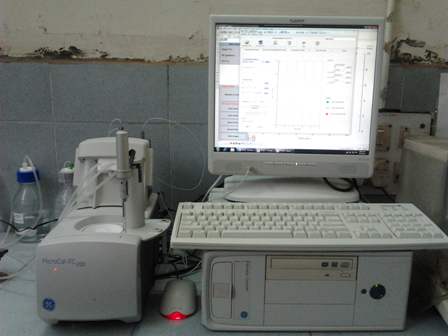- Existing Central Facilities
- Central Glass Blowing
- TEM
- SEM
- AFM/STM
- Liquid Nitrogen
- NMR
- MALDI/MS
- SCF Bio-informatics
- Rapid Protyping
- GC/MS

Isothermal Calorimetry (ITC)
Model:
Status: Working
Location: MS729 (Chemistry Department)
Contact Person: Dr. Shashank Deep (6596),
Mr. Vinay Kumar (6565)
Email Address: sdeep@chemistry.iitd.ac.in
i. To study the energetics and binding interactions of several ligands and designed organic and inorganic molecules (drugs) with target proteins, enzymes, and nucleic acids. |
| Brief Detail about ITC |
Understanding the key issues and determinants of biomolecular interactions with each other and with specific and nonspecific ligands is of fundamental importance and practical interest, since it provides the fundamental know-how for development of structure-based molecular design-strategies. The understanding of molecular recognition processes of small ligands and biological macromolecules requires a complete characterization of the binding energetics and correlation of thermodynamic data with interacting structures involved. Monitoring energy changes during binding interactions is a key issue that will enable us to generate effective technologies for use in the pharmaceutical and enzyme industry and to understand complex regulatory pathways and interaction networks in biological systems. Such changes can be effectively monitored directly only by Ultrasensitive calorimetry techniques that have become available for some time now. These devices can measure temperature changes of the order of microdegrees and energy changes of the order of microcalories, commensurate with the subtle changes often observed during conformational changes or binding interactions in biomacromolecules like proteins, nucleic acids, and lipids. ITC is vital in the study of multiprobe structure activity relationship (SAR) since it can detect contributions that affinity-only methods may miss. The binding constant measured by these affinity methods may be similar for a wild-type and mutant protein binding to a drug, but ITC can reveal differences in enthalpy (Δ H) and entropy (ΔS) of binding that can describe the mechanism of action of binding. This information can validate in-silico modelling. Various biochemistry, organic chemistry and physical chemistry labs at the IIT Delhi plan to collaborate to understand various molecular recognition processes using ITC. We also plan to use the data from ITC to validate in-silico modeling of various interactions carried out by computational research groups. The researchers at IIT Delhi have all the relevant expertise in the area of thermodynamics and Biothermodynamics using primarily calorimetry as a tool. Our department does not have any isothermal calorimeter facility which hampers our persuit for high quality research through various collaborations. The current practice of teaching thermodynamics and molecular recognition to B. Tech, M.Sc., M.Tech and Ph.D. students in theory courses can be fruitfully complemented through offering practical experience. The setting-up of such a facility at IIT Delhi would facilitate its use by the various groups not only in the Delhi and the Northern part of India but from elsewhere in the country as well. |
Facilities




